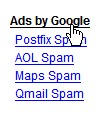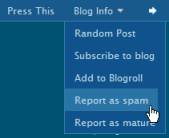Reporting Blog Content Thieves
Want to know what I did over the weekend? Sure you do! It was fun. It was full of laughs. It was a thrill a moment. It was a weekend that I will remember a life time.
I spent the weekend hunting down, commenting, emailing, and reporting content thieves.
No, it was not fun. Nobody laughed. The only thrill came from reporting the evil doers. Unfortunately, the thrill was dampened with the overwhelming feeling that it will come to naught, even though Google and many web hosts like Blogger say they are taking splogs and copyright violations seriously. But that won’t stop me.
If you want to put an end to the rip off your content, report it.
Here’s why.
- One splog rips off content from many blogs, not just yours.
- Report for those who don’t know they’ve been ripped off.
- Report for those who do know but feel helpless in the face of so many.
- Report for those who think reporting is useless.
- Report for those who will be ripped off in the future as long as splogs continue to get away with it because no one reports them.
- Report because it is your right to protect your work.
- Report because splogs make thousands of dollars a year with your content.
- Report because it is your content. You worked hard on it. It’s your words. Own them. Let their power work for you, not someone else who did nothing and gains everything.
According to one source, a splog could make over USD $50,000 a year from your content. It’s your work working for them.
This weekend, I found one splog (spam blog) published more than 14,000 posts in one month, stolen from blogs all over the web. There were more than 50 of my own articles, which is only 0.3% of the total. Yours could be one of them.
 Let’s do more numbers. If the splogger treated everyone equally at limiting themselves to 50 posts each, that would mean that 280 blogs were ripped off. What if all of them reported this splog to Google, Yahoo! and others? Wouldn’t that send a message?
Let’s do more numbers. If the splogger treated everyone equally at limiting themselves to 50 posts each, that would mean that 280 blogs were ripped off. What if all of them reported this splog to Google, Yahoo! and others? Wouldn’t that send a message?
What if 50%, 140 bloggers reported them? That would send a message, too. If I’m the only one reporting, then it doesn’t carry much weight. Even if three or four people report this, it would probably get attention, so why not add yours to mine and increase the odds of this site being shut down?
In What Do You Do When Someone Steals Your Content and Finding Stolen Content and Copyright Infringements, I go into depth about what to do and how to find if your content has been stolen and how to report it.
Basically, there are three ways to find if your content copyright has been violated on the web.
- A link from within your blog posts links to your blog. It will appear as a trackback or within a search engine as a page linked to your blog.
- A search of content unique to your post turns up copies of your blog post in search engines.
- A search of unique content inserted by a digital fingerprint plugin in your post feeds reveals unauthorized usage.
Unique content is any phrase or combination of words that is unique to your article or blog. For example, “Lorelle on WordPress” is a fairly unique phrase if used in a search engine wrapped with quote marks, but the results will mostly be to those who name and link to my blog, not necessarily steal my content. “Want to know what I did over the weekend” is not unique but “weekend hunting down, commenting, emailing, and reporting content thieves” is unique enough to return search results to help me track down this article.
You can search for unique content specific to a blog post, or to each post, such as the copyright notice I use on my blog: “Copyright Lorelle VanFossen, member of the 9Rules Network”. This would be similar to a digital fingerprint, unique content to my own blog, if they use the whole post as it comes through a feed.
To find copyright violations of your blog content by searching for unique content, you can use:
- Google Images (for photographs and graphics)
- Yahoo ! Search – Image Search
- Google Blog Search
- Google Advanced Search
- Yahoo Advanced Web Search
- Copyscape
If you have a link to your blog on your blog posts, it will create a trackback, linking back to your blog. To hunt on Google or Google Blog Search, like this Google Blog Search for links to Lorelle on WordPress, you can use the link: advanced search method to find all blogs linking to yours.
link:http://example.wordpress.com/
To hunt links to your blog via Yahoo!, you would use:
u:lorelle.wordpress.com
Technorati offers a link search, too.
http://www.technorati.com/search/http://example.wordpress.com
IceRocket, Furl, del.icio.us, ma.gnolia, and other social networking services also include the ability to search by URL, looking for sites which link back to yours.
You can also take advantage of AntiLeech Splog Stopper and Digital Fingerprints WordPress Plugins (my reviews of these options) to track content thieves by inserting digital “fingerprints” into your content’s feed which then can be used to search search engines to find the unique content or “fingerprints”.
Reporting Splogs and Copyright Violations
If your blog’s content copyright has been violated by an ignorant blogger, one who just doesn’t seem to know Copyright and Fair Use law, a comment or email requesting the content be removed or reduced to an excerpt in accordance with Fair Use will usually solve the problem quickly.
If the copyright violation continues, or is clearly a splog abusing a lot of blogger’s content, it’s time to take more serious steps to report the splog.
Copyright violations and splogs can be reported to Google with the new Google Report Spam form. You can get more information on Google’s policies from their Google’s DMCA Statement and Policy.
 Google also offers a way to fight back against the use of Adsense ads on splogs, those making money from your content. You can email them directly at [email protected] or click the Ads by Google link in the ad, and at the bottom of the resulting page, click the link to “Send Google your thoughts on the site or the ads you just saw” which includes the web page URL you were just visiting. Report the use of Google Ads on this splog.
Google also offers a way to fight back against the use of Adsense ads on splogs, those making money from your content. You can email them directly at [email protected] or click the Ads by Google link in the ad, and at the bottom of the resulting page, click the link to “Send Google your thoughts on the site or the ads you just saw” which includes the web page URL you were just visiting. Report the use of Google Ads on this splog.
WordPress.com and Google’s Blogger/Blogspot blogs offer easy flagging of spam blogs or splogs. Click the Flag This Blog button on the Blogger bar on Google Blogger/Blogspot blogs or report directly via the Blogger Talk to Us page.  On WordPress.com, you can mark splogs via the WordPress.com bar visible to members, choose Blog Info > Report as Spam. If you are not a member of WordPress.com, you can report splogs directly via the WordPress.com Contact Support form.
On WordPress.com, you can mark splogs via the WordPress.com bar visible to members, choose Blog Info > Report as Spam. If you are not a member of WordPress.com, you can report splogs directly via the WordPress.com Contact Support form.
Other search engines will also accept reports of copyright violation:
- Yahoo DMCA Policy and Instructions
- MSN – About DMCA and Reporting Policies
- Ask.com – Copyright and DMCA Notification Information
- Technorati Support Contact Form (select “other” for splogs and spammers)
Splogs can also be reported through Splog Reporter and Splogspot Submit Splogs, although I still haven’t uncovered what good reporting them to these services does other than add them to a list. Who uses the list to stop the splogs?
Splogs work in harmony with their spam blogs and comment spam and trackbacks, linking to each other in turn. Removing comment spam from your blog manually or through Akismet, Bad Behavior, and/or Spam Karma will help take the “link juice” out of comment spammers and sploggers.
It’s not just about ripping off your content. Many splogs get away with it by not linking to your content nor stealing “enough” to be prosecuted. They use your blog posts, blog name, page ranking, and reputation as endorsements without links. This weekend, I found plenty of splogs using my “good” name to endorse their marketing crap. For example, on an “Occupational Therapy” blog, I found:
Comment on Mainstream Corporations – You Do Not Get to Blog by …
Philosophy Skin Care,Occupational Therapy Jobs,No Carb Diets,New Orleans Plastic Surgery,Olympic Weights,Philosophy Products,Occupational Therapy School,Occupational Therapy Assistant,Personal Care,New Hair Loss Treatment,Philosophy …
Source: lorelle.wordpress.com
 The reference, without a link, is to Mainstream Corporations – You Do Not Get to Blog and the splog post has the same title. These words were not in the post, and they are not my words. There is no direct link to my blog or post, but I’m still “credited” with this crap. I found this splog by checking my blog URL and name in Furl.
The reference, without a link, is to Mainstream Corporations – You Do Not Get to Blog and the splog post has the same title. These words were not in the post, and they are not my words. There is no direct link to my blog or post, but I’m still “credited” with this crap. I found this splog by checking my blog URL and name in Furl.
I did have a moment of joy when I found an excerpt from my article, How To Spot a Splog, appeared in another splog about generators and electronics. The excerpt described this splog perfectly.
For more information on splogs and how to track them down, see:
- What is Copyright?
- US Copyright Office
- How To: Check Your Logs for Spammers and Splogs using AWstats and Excel
- Stopping Adsense Splogs & Spammers: Methods that Work
- Wired – Spam + Blogs = Trouble
- How To Spot a Splog
- Quick Online Tips – How to Complain and Report Spam Blogger Blogs
- Reporting Spam Blogs – Splogs
- Stop Content Theft Buttons and Badges
- Plagiarism Today
- Applaud Those Who Warn You: Your Blog’s Content Is Being Stolen
- Blog Critics – Copyright And The Blogger Syndicate
- Splogs – The Dark Side of Blogging
- The Bitacle Battle of Blogs
- Allan Jenkins – Bitacle Splogger Scam Updated: Some Thoughts on Copyright Violations
- Plagiarism Today – A Plan for Action
- What Do You Do When Someone Steals Your Content
- Finding Stolen Content and Copyright Infringements
Lorelle VanFossen blogs about blogging and WordPress on Lorelle on WordPress.
The author of Lorelle on WordPress and the fast-selling book, Blogging Tips: What Bloggers Won't Tell You About Blogging, as well as several other blogs, Lorelle VanFossen has been blogging for over 15 years, covering blogging, WordPress, travel, nature and travel photography, web design, web theory and development extensively as web technologies developed.


Fantastic article Lorelle.
Reporting Content Thieves is a best practice that should be done by all bloggers large and small — even if you think your blog ‘isn’t worth it’. At the very least letting Google know through their adsense reporting mechanism is something that is quick, painless, and worth doing. After all, I think ts best to hit these guys where it hurts — their wallets.
Cheers
tony.
Lorelle
Really good write up. As a service provider of filtered RSS content, we see a ton of this show up and are continuously monitoring which blog search engine does the best at filtering out splogs. At last count, Google was the best but Technorati has recently caught up as well. The blog search engines can do a lot of the heavy lifting here by removing sploggers from their indexing thereby reducing their footprint.
You could also use ZapTXT to monitor your own posts and receive a notification when ever a post shows up. Cheers, Sameer
I come across content thieves often. In most cases a simple cease and desist removes my content from their splogs, sometimes it gets ugly. I believe this is worth fighting, however.
large and small — even if you think your blog ‘isn’t worth it’. At the very least letting Google know through their adsense reporting mechanism is something that is quick, painless, and worth doing. After all, I think ts best to hit these guys where it hurts — their wallets.
You have to link to your sources but bloggers get informations somewhere blogging is not a miracle.
Justin
seedubai.blogspot.com
Justin — quoting content is fine. Lifting an entire post word-for-word, even when you attribute it, is not.
Tony.
I did my taxes over the weekend.
Who do I report Revenue Canada to for stealing the content from my wallet? :)
Heh heh — I hear that, Engtech … I hear that ;)
I feel your pain. I’ve had to hunt down quite a few content thieves and as a result, also wrote a tutorial on how to deal with them. I hope you can add it to your list:
How to Protect Your Website’s Copyright When Someone Steals Your Content
I’m more then happy to help in your quest to shut these guys down! Say the word and I’ll do my part!
Fair Use in Copyright permits no more than 10% of the total, which has become standardized for blog use to 200-400 words – no more. This is how you can use quotes, known as blockquotes, to reference other blog and website content. Any more than that and you may violate the copyright owner’s rights.
Thanks for the info on how to hunt these content thieves down. Let the hunt begin.
Anyone know how to report a site to amazon?
The site in question is an amazon affiliate with the ID egalot-20
How do I get Amazon to cancel their affiliate account?
From what I could determine in my hunt for an answer is that you just email them through their customer service contact email. It’s on all the HELP pages. If you find a better method or more specific step-by-step instructions, please let me know.
I’m really tempted to create a site that has a form for:
your name
email address
offending page
original page
and then autoscans the site in question and reports them to google, amazon, etc.
That would be cool, but that also bypasses the DMCA forms that these services sometimes insist on. If an agreement could be made with these agencies to accept such submissions, and a way to auto-verify the submissions, I’d be first in line with a LONG list of creepy copyright criminals.
This is a great article but the truth is I’d rather be writing than tracking down thieves. I’m simply not willing to invest the effort to hunt down these asshats who steal content. If there were a simpler system in place I’d be much more willing. But as it is, I have little incentive.
Original Blog content should be copyrighted. It is sad to see people ripping it off. But, the question is, what can be done about it?
Hard to say …
Steve